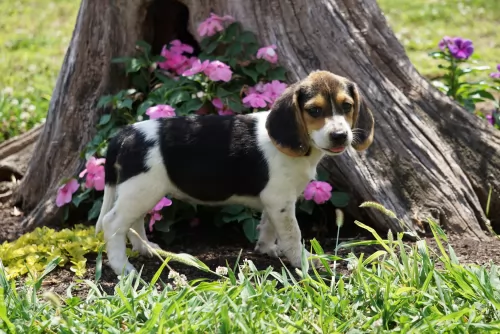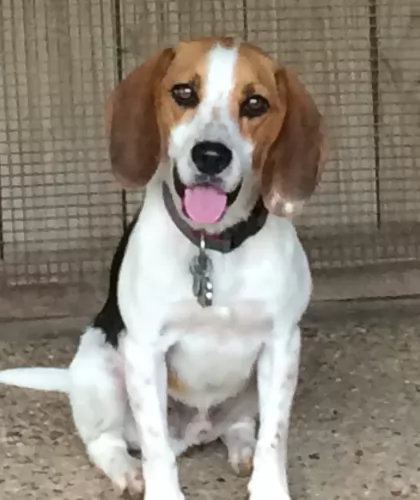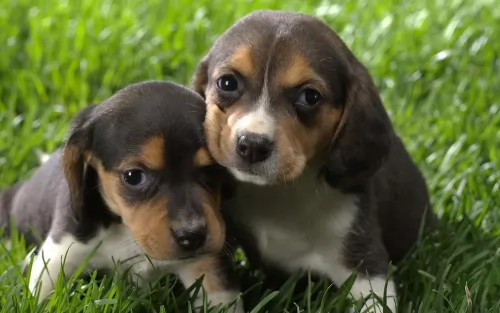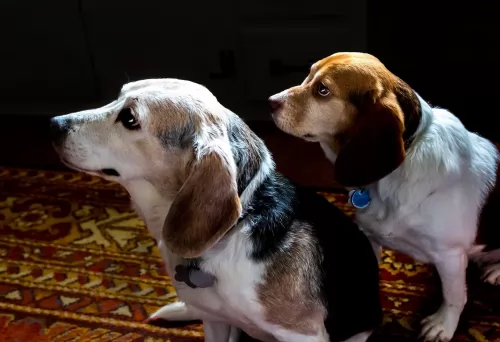 Petzlover
PetzloverBoth Beagle and English White Terrier are originated from United Kingdom. Both Beagle and English White Terrier are having almost same height. Both Beagle and English White Terrier are having almost same weight. Beagle may live 8 years more than English White Terrier. Beagle may have more litter size than English White Terrier. Beagle requires Low Maintenance. But English White Terrier requires Moderate Maintenance
 There are some accounts of similar size dogs used for hunting in Greece in 5th century BCE. During 8th century the Talbot Hound breed was created. In 11th century Talbot Hound was brought to England by William the Conqueror. While using in hunting they are found to be a slow runner. To overcome the situation and increase their running speed the hunting people bred Talbot Hound with Grey hounds. The beagles described earlier were very small in size and are said as pocket beagles.
There are some accounts of similar size dogs used for hunting in Greece in 5th century BCE. During 8th century the Talbot Hound breed was created. In 11th century Talbot Hound was brought to England by William the Conqueror. While using in hunting they are found to be a slow runner. To overcome the situation and increase their running speed the hunting people bred Talbot Hound with Grey hounds. The beagles described earlier were very small in size and are said as pocket beagles.
The English White Terrier was developed in the 1860’s by a group of breeders from the Sealyham terriers, the Jack Russell terrier, and the Fox Terrier. These breeders were looking for a white terrier that could be more successful in the show ring than the current prick-eared English terrier. They named their new breed, the English White Terrier or the Old English terrier. In later years in the United States, the English White Terrier was mixed again with the Rat Terrier and the Old English Bulldog to create both the Boston terrier and the Bull terrier.
Although the breed did not last long it did have a prestigious ancestry that could be traced back centuries in England among ancient terriers. The word terrier was in use in England in 1440, showing that the dogs were well known at that time. Most historians agree that the dogs were even older than the 1400’s. It is believed that terriers who “went to ground” after prey, existed as far back as the time of Christ in England.
Most of these ancestors of the English White Terrier were not white. White terriers came onto the scene around the 1700’s.The first picture of white terriers appeared in 1790 when Sawre Gilpin, a British artist, painted “A Huntsman with Hounds Foxhunting” and the terriers in the painting were white with brown marks. Others began to show the same kind of terriers in their artwork – white coated. Before this it is believed that breeders killed the white terriers at birth because they were often deaf and inferior to the other terriers. In the early part of the 19th century, the white terrier began to be completely white with no markings. The Kennel Club recognized them in 1874 as the White English Terrier.
The breed faced many genetic issues, deafness and the Kennel Clubs felt there was no difference between the current White English terrier and the English White terrier despite the difference in their ears. The new English White Terrier had dropped ears instead of Prick-ears. They considered them to be the same breed and not even different types. They were the smallest of all terriers and considered to be a good pet but not a show dog or a working dog. Because of this it was not very popular, and it actually had been bred to be a show dog and not a working dog. The English White Terrier was not recognized by any Kennel Club and within 30 years it was extinct.
 They are small and compact breed, and always happy and fun loving. They should be trained by patient and creative training techniques. Beagles are very much interested in using their nose in finding interesting scents and are food focussed. They always wake their neighbours at 6 am by their half howling. They think everyone is their best friend and love to have friendship with other animals and humans. They have about 220 million scent receptors and are said as "a nose with feet" by humorist Dave Barry.
They are small and compact breed, and always happy and fun loving. They should be trained by patient and creative training techniques. Beagles are very much interested in using their nose in finding interesting scents and are food focussed. They always wake their neighbours at 6 am by their half howling. They think everyone is their best friend and love to have friendship with other animals and humans. They have about 220 million scent receptors and are said as "a nose with feet" by humorist Dave Barry.
We can see beagles at many airports in their duty. They can easily trace out the illegal things being smuggled. Since they are small in size they are suitable for apartment living. But they like to walk around several times. They should be exercised for plenty of time. Obedience training should be given to them by giving food reward. Beagles are wanderers of nature and so if possible they will try to escape. So it is necessary to make them microchipped or to wear a collar, to find them easily.
The English White Terrier had a pure white coat with no markings of any kind. His coat was short, hard, and glossy and his body was firm, muscular and hard. The breed was small – almost a toy. They had a body like the Manchester Terrier. They had long legs and large feet. The tail was medium size and straight out from the body.
The English White Terrier had a very refined head with a fairly long muzzle. Their bite was even, and their eyes were brown, amber or black. Their ears dropped – unlike the pricked ears of the White English Terrier.
 They are very good companion for children. They love to play and spend time with children.
They are very good companion for children. They love to play and spend time with children.
They have millions of scent receptors and so they can be seen in Airports and many important places in duty. Also they are interested in hunting small rodents.
They adapt well for apartment living but they don't like being alone for a long time. If kept alone for a long time in back yard they will begin to bark and dig pit or try to escape. Beagle likes hot weather more than cold weather.
Beagles are difficult to train up. Many people say it will take about one year to house train beagles. They have an attitude of "what's in it for me". But it depends on the personality and temperament of the individual.
The English White Terrier was affectionate and devoted to his family. It was the softest tempered of all terriers and made an excellent pet. Some of the English White Terriers were animal aggressive while others were not. Training was difficult because of the wide-spread deafness in the breed. IT loved to be cuddled and held. They were also tenacious and game for any type of fight or hunt despite their size and deficiencies.
 Beagle's ears should be checked occasionally for any sign of infections like discoloured wax, dirt or foul odour. Also their nails should be trimmed regularly. They should be exercised regularly in order to maintain a proper weight. The most common health problems in beagles are obesity, epilepsy and allergies.
Beagle's ears should be checked occasionally for any sign of infections like discoloured wax, dirt or foul odour. Also their nails should be trimmed regularly. They should be exercised regularly in order to maintain a proper weight. The most common health problems in beagles are obesity, epilepsy and allergies.
They are average shedders and having short hair thus it is easy to groom. They should be made to bath with a mild and non irritant shampoo.
The breed was considered to be unhealthy for the most part and became extinct because of this. Many complained that the breed was inbred and had a weak constitution because of it. Deafness was prevalent throughout the breed. This deafness occurs in many white animals, but the English White Terrier had the highest rates among all white dogs.
 After 4 weeks of birth the puppy can be given solid foods by slowly increasing the ratio for many weeks. The recommended food is fresh meat of chicken breast, lamb, turkey and lean hamburger. The vegetables can be given as raw or steamed. The vegetables that will be good for them are raw baby carrots, broccoli, cauliflower and sweet peas. The puppies should be fed 3 to 4 small meals per day as they require more nutrients for their growth.
After 4 weeks of birth the puppy can be given solid foods by slowly increasing the ratio for many weeks. The recommended food is fresh meat of chicken breast, lamb, turkey and lean hamburger. The vegetables can be given as raw or steamed. The vegetables that will be good for them are raw baby carrots, broccoli, cauliflower and sweet peas. The puppies should be fed 3 to 4 small meals per day as they require more nutrients for their growth.
The grown up dog should be fed with the same food and 1 complete meal is enough for them. The meal should be given at noon. The food should be given based on calories as they should not get overweight. In addition to food, fruits such as blueberries, raspberries, banana and mango can also be given to them periodically.
Beagles should be exercised daily in order to maintain proper weight. Beagles are average shedders and having short hair which is easy to groom. They should be made to bath periodically with a mild shampoo.
Moderate exercise such as walking and cardio exercise such as chasing a ball should be given to them for staying them to be active and for maintaining good health.
It was best to feed the English White Terrier 1-2 cups of dry meal per day served in 2 meals.
As mention previously, the English White Terrier was congenitally deaf and had a weak constitution.
This little dog with all its problems was still a very energetic dog and needed considerable exercise. Owners had to develop exercises and games to keep the English White Terrier occupied as with any terrier. If they didn’t have a job or something to occupy their minds and bodies, they were destructive.